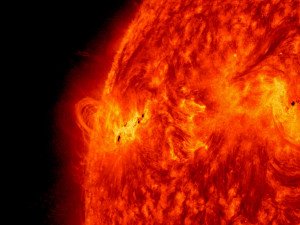In the wake of new research suggesting that we might be heading into a mini ice-age, media outlets have dug deeper into the science.
 The study, presented at the UK National Astronomy Meeting this month, outlined a new model of solar activity which was based on two separate internal cycles in the sun interacting.
The study, presented at the UK National Astronomy Meeting this month, outlined a new model of solar activity which was based on two separate internal cycles in the sun interacting.
According to a press release about the research: “Predictions from the model suggest that solar activity will fall by 60 per cent during the 2030s to conditions last seen during the ‘mini ice age’ that began in 1645.”
The initial wave of reporting on this research drew attention to the ice age angle and headlines such as “Ice age coming” and “Is Earth headed for a mini ice age by 2030?” were not uncommon.
However in the ensuing days since the research was first publicised, some outlets have been delving deeper into the research, offering their audiences a more nuanced understating of the situation. Some examples are listed below.
On RadioLIVE’s Sunday morning show, presenter Mark Sainsbury ran back to back interviews with a number of researchers specialising in physics and climatology. Interviewees (with links to audio), included:
- Prof Craig Rodger,University of Otago
- Prof James Renwick, Victoria University Wellington
- Assoc Prof Sean Oughton, University of Waikato
- Prof Andy Sturman, University of Canterbury
Further follow-up reporting on the story by the Dominion Post‘s Olivia Wannan also drew on comment from Prof James Renwick and Dr Claire Bretherton from the Carter Observatory.
A further wrap-up of reaction by Erica Matherwas published in the Gisborne Herald (after originally appearing on the on the new Sciblogs News blog).